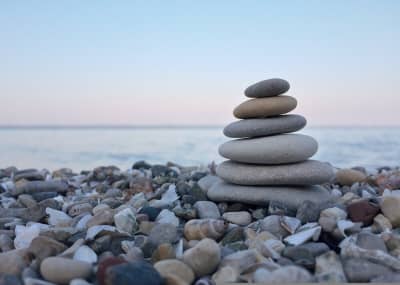William Morris once famously said: "Have nothing in your house that you do not know to be useful, or believe to be beautiful."
Some of you may be very good at keeping your living spaces clear and living a minimalistic life as far as personal possessions go. Most of us can only aspire to that. "Stuff" seems to come into our life and sticks like glue.
The emotional cost of this clutter however, takes its toll on our mental well-being. Common forms of clutter that can have a hugely negative impact are: (and I speak from personal experience)
1. The gifts from loved ones.
Mothers are particularly good at this. They give you gifts and then you feel you have to keep them always. A friend of mine has a great saying: "Keep the love it came with. Pass on the object that contained that love; it's just the wrapping".
2. The "just in case" objects.
I once kept a Savarin mould for twelve years without once actually making a savarin. I'm not even sure if I know what one is – certainly I've never missed it in the five years since I found the courage to pass it on.
3. Objects connected with past unhappiness.
I don't care how useful it is, or how beautiful; if it makes you sad or feel bad, it should go. Replace it with something that you do feel good about.
4. Those "bargains"...
Most often found in our wardrobes, these items remind us of the time we bought the shoes that pinched because they were cheap, or that third tee-shirt in drab olive, just because it was buy-two-get-one-free. Let these things go: they only remind us of bad decisions.
5. The stuff that isn't really you.
In the past I've kept books that I thought looked impressive. But I could never get beyond the third chapter of Stephen Hawking's "A Short History of Time" and, quite frankly, I really don't enjoy Dickens. So what's the point of using up valuable bookcase space on him, just because it looks more erudite than the Agatha Christies and Nora Roberts? It's lying by implication really, isn't it? It eats away at your integrity and authenticity.
6. Excess.
Would someone please tell me why I have 126 wineglasses? And why there are 15 ball-points and 24 pencils in the pot by the phone (I've just counted)? This must be insecurity clutter here. The resistance to getting rid of it is just about resistance to change. Take a deep breath and get over it. Move on and keep that energy moving.
7. Other people's stuff.
It doesn't belong to us, so we can't get rid of it. If we have agreed to keep something on behalf of someone else then there has to be a time limit. After that, we start charging!
8. General stuff that arrives.
Magazines, receipts, junk mail etc. We need a system and a regular diary date to deal with them. It becomes an issue when the quantity builds up to unmanageable proportions and it just gets overwhelming.
So – some of the above points I think I've mastered. Others – well, just writing this has inspired me to get started. I'll let you know how I get on.
Mary
A Moodscope user.



Comments
You need to be Logged In and a Moodscope Subscriber to Comment and Read Comments